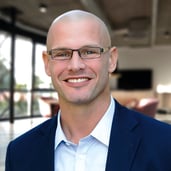symplr CEO on Investing in Healthcare Operations Technology

The symplr Compass Survey of technology leaders, all members of the College of Healthcare Information Management Executives (CHIME), found them motivated to digitally transform their healthcare operations despite financial pressure, widespread healthcare workforce problems, and other challenges.

Next, we asked symplr's top executives to share their outlook for healthcare operations and technology. symplr CEO BJ Schaknowski's responses and reactions follow.
Get your copy of the symplr Compass Survey
What are 3 reasons why investment in healthcare operations technology matters?
First, there is a crisis relative to healthcare labor and staffing levels. We don’t have enough nurses, physicians, or ancillary staff. Research shows that up to 47% of healthcare workers plan to leave their positions by 2025. Technology can do two things: It can make staff more productive, which is critically important to maximizing and optimizing the levels of care individuals can provide inside of a shift, inside of a day, inside of a week or a month. Technology can also make people more productive and give them time back to do what they're supposed to do, which is to focus on patient care.
Second, technology improves the healthcare worker experience. If clinicians and staff have access to simple workflows and tools that enable their work rather than hinder it or create obstacles, that helps to alleviate emotional and satisfaction drains, which in turn can aid retention. Systems that employ technology the right way will hold on to their staff longer.
Healthcare investments in technology also matter because, when properly selected, they save a system money. Investments in workflow automation, cost containment, standardization of tooling and processes are all examples. New or upgraded technology has a cost. But what does a reduction in patient readmittance mean to a system? What does a reduction in spend via vendor consolidation mean to a healthcare organization? What value lies in the ability to see more patients in a given day because the system manages a more streamlined tech stack? Investing in technology is likely the shortest path to meaningful financial benefit for many health systems.
The symplr Compass survey shows that 88% of healthcare executives are tired of disjointed systems. What can symplr do to solve that concern?
The real question is why aren’t 100% of healthcare executives tired of disparate systems? Siloed systems add risk, cost, and complexity to an already overly complex healthcare system. Technology consolidation benefits healthcare systems. Consider the ability and convenience for a nurse to use the same login, password, the same standards and protocols, and have the same data automatically appear as she travels among system sites and facilities. Imagine the ability to look at common facility access or provider data across your five, six, 12, or 100 facilities to understand which are as productive, safe, or compliant as they could be, and which are not.
By using an enterprise healthcare operations system, administrators or executives focus on the areas that require attention, and avoid spending unnecessary time and resources on those operating optimally. Everything about technological consolidation benefits healthcare system executives. symplr can provide guidance not only what tools to consolidate, but on the best way to use them to achieve the optimal impact. Simply adopting technology and using it the same way you were using it before, or applying multiple tools disjointedly, provides no benefit. When you capitalize on connected, enterprise technology while successfully championing change management and process improvement with people, you really get extraordinary results—and symplr can help in all those areas.
What industry trends keep you excited about the future of healthcare operations?
At symplr we’re incredibly excited to consolidate and standardize what has been a wildly disparate patchwork of applications across healthcare operations. Healthcare systems using 200, 300, or 400 different, disconnected systems to run their operations are coming to us for help. They don't have consistent and reliable data. They don't have effective and productive workflows. Their staff are frustrated and exhausted, spending more time doing manual administrative tasks inside of software tools than they do providing care—and that’s problematic. The ability for symplr to help these health systems consolidate their tech stack for all healthcare operations is important and will be essential to the provision of patient care in the U.S.
We’re also excited about helping health systems better leverage data and insights to run more effectively. For many years, all of the manual processes, all the disjointed workflows have made the aggregation and synthesis of the data necessary to understand system operational competency almost impossible to achieve. Now we’re seeing a real desire to better leverage data because of labor shortages and the resulting impact on healthcare workers, among other reasons.
Gathering, accessing, sharing, and using data optimally to make better workforce decisions is groundbreaking when you consider that it affects decisions about staffing levels, the clinical expertise needed on certain shifts at certain times, around compliance, quality, and the safety of patients. And that’s just in workforce management. There's so much healthcare operations data available to health systems that is not being optimized, that otherwise would empower them to run more productively and efficiently across spend management, provider data management, compliance, and other areas. Now, for the first time, many are beginning to acquire the technology and resources to consume and to act on their healthcare operations data.
What symplr accomplishments this year are you most proud of?
The first is our absolute focus on customer outcomes. Customers are at the heart of everything we do, and delivering real outcomes for them means we're doing our small part to improve U.S. healthcare. Whether in patient outcomes, financial outcomes, or healthcare worker outcomes, at symplr we’ve maintained an incredibly regimented focus on delivering for our customers this year, and I'm just so proud of that on behalf of the almost 2,000 of us.
The next thing I'm incredibly proud of is the positive change we've undergone as a company. We've acquired seven best-in-breed companies in the last 24 months. Integrating the people and technologies within them, determining best practices, and developing enterprise standards that are consistent across the symplr enterprise and symplr ecosystem is not easy work. But we've stayed focused, executed on good change management practices, and we’ve gotten to a great place.
"The symplr team is an incredibly engaged one. I couldn’t be prouder because an engaged team will achieve incredible results."
Finally, I often think the culture of an organization can be forgotten when looking at the financial results or the category trends relative to increasing market share, and everything else inherent in operating a business. At symplr, we’ve intentionally focused on culture, and it has strengthened us—whether you look at our Employee Net Promoter scores, or our employee retention, which is much better most technology companies. When you look at the engagement of our people in both our core business activities and the optional activities that we've made available—like lunch and learns, speaker series, and Susan G. Komen initiatives—the symplr team is an incredibly engaged one. I couldn’t be prouder because an engaged team will achieve incredible results.
